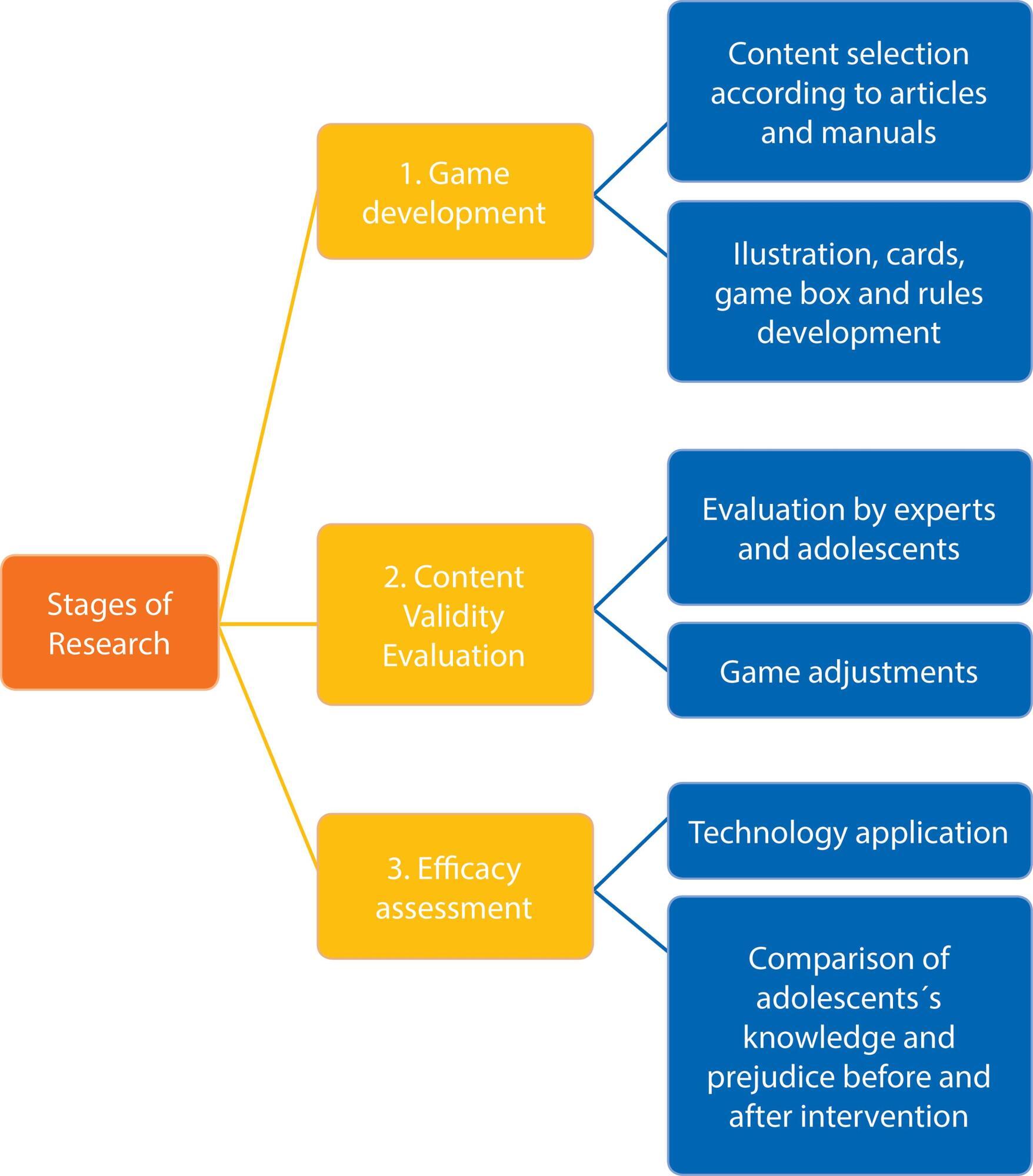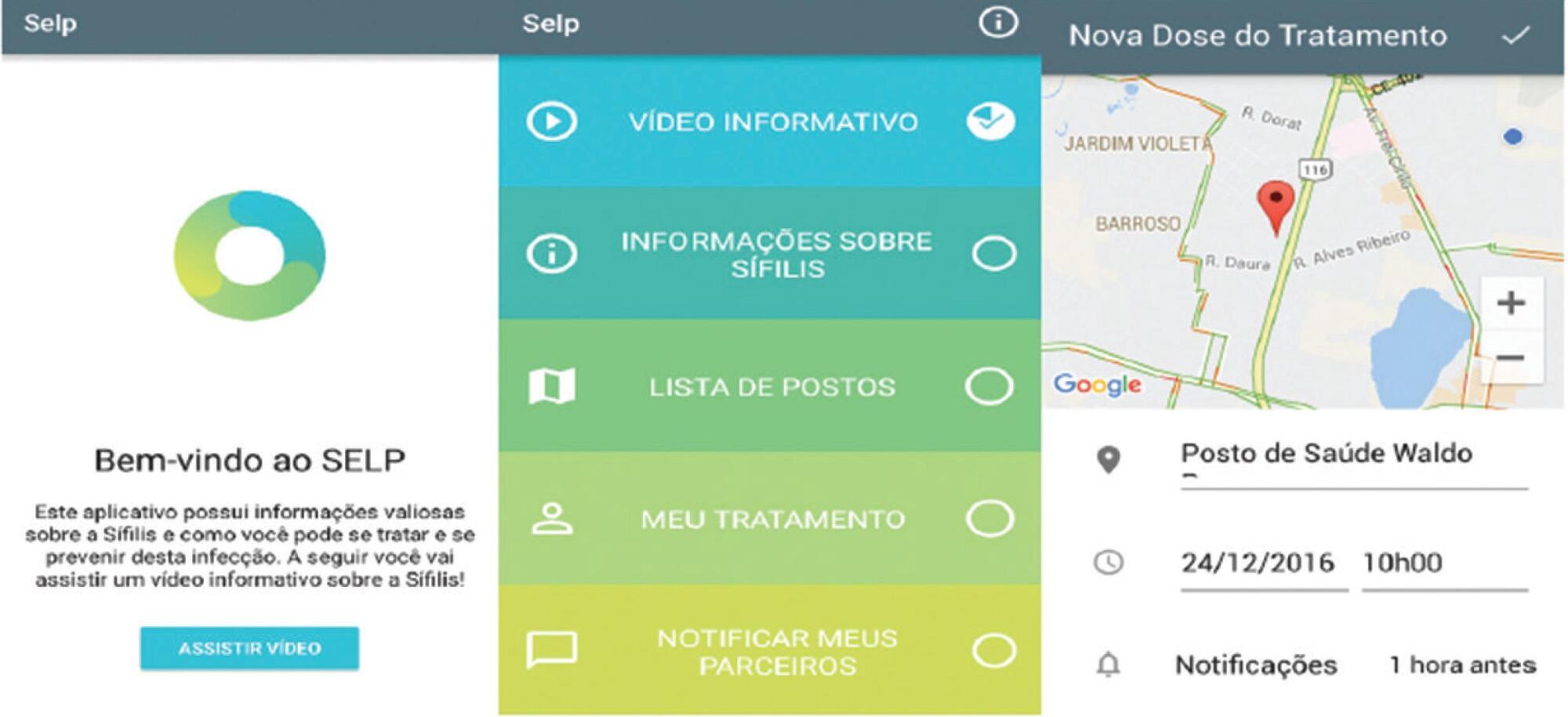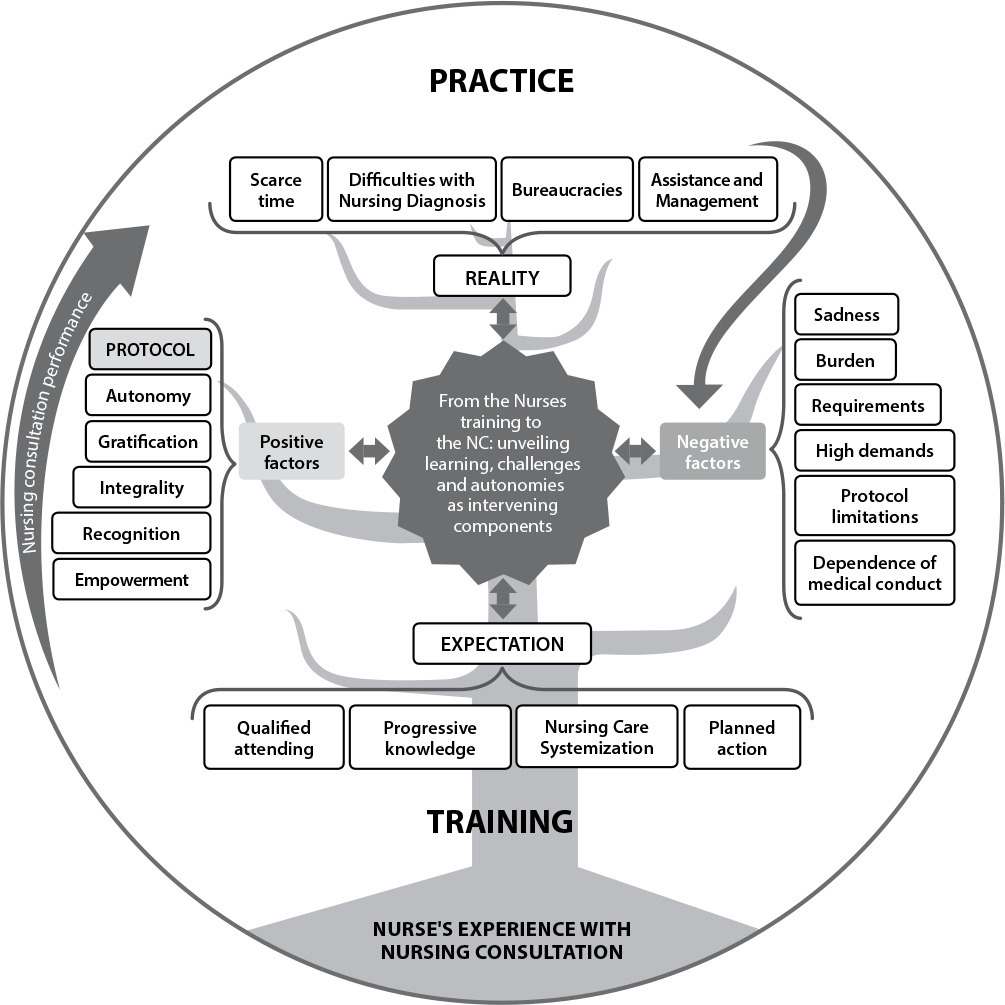-
01-01-2016
Nurses’ managerial knowledge in the hospital setting
Revista Brasileira de Enfermagem. 2016;69(4):676-683
Abstract
Nurses’ managerial knowledge in the hospital setting
Revista Brasileira de Enfermagem. 2016;69(4):676-683
DOI 10.1590/0034-7167.2016690409i
Views0See moreABSTRACT
Objective:
to analyze nurses’ managerial skills in the hospital setting, their perception of their own education and the relevance of training for their professional practice.
Method:
qualitative study based on the dialectical hermeneutics framework. Thirty-two nurses from three hospitals in the Brazilian state of Minas Gerais contributed to the study by taking part in six focus groups. Records were transcribed and three categories emerged from content analysis.
Results:
results evidenced the following managerial skills: supervision, leadership, decision making, planning and organization, as well as the relevance of education centers for their improvement and the continuing development of the nurses’ managerial skills.
Conclusion:
the authors believe this investigation will contribute for the improvement of nurses’ necessary managerial skills and also to identify gaps in this area of their education.
-
01-01-2016
Analysis of obstetric care provided by the Mobile Emergency Care Service
Revista Brasileira de Enfermagem. 2016;69(4):669-675
Abstract
Analysis of obstetric care provided by the Mobile Emergency Care Service
Revista Brasileira de Enfermagem. 2016;69(4):669-675
DOI 10.1590/0034-7167.2016690408i
Views1See moreABSTRACT
Objective:
analyze the pertinence of calls made by obstetric users of the Mobile Emergency Care Service (SAMU 192) of Botucatu-SP.
Method:
retrospective and analytical research. All records of prehospital obstetric care delivered by the SAMU 192 in 2012 were analyzed. To be considered responsive, calls should lead to referral to a reference obstetric hospital or be classified with the colors red, orange and yellow, according to risk criteria defined by the Ministry of Health.
Results:
considering the two outcomes evaluated: referral to a reference hospital and risk criteria defined by the Ministry of Health, 6.7% and 75.6% of the calls were not pertinent, respectively. There was no matching between outcomes, neither variation between primiparas and multiparas as regards the call pertinence.
Conclusion:
this study ratifies the need for implementing a risk classification protocol in obstetrics, and support managers in the organization, qualification and effective implementation of the Rede Cegonha.
-
01-01-2016
Experiences with severe maternal morbidity: a qualitative study on the perception of women
Revista Brasileira de Enfermagem. 2016;69(4):662-668
Abstract
Experiences with severe maternal morbidity: a qualitative study on the perception of women
Revista Brasileira de Enfermagem. 2016;69(4):662-668
DOI 10.1590/0034-7167.2016690407i
Views0See moreABSTRACT
Objective:
to know and analyze the experiences of women who developed an episode of Severe Maternal Morbidity.
Method:
this is a qualitative study, in which we interviewed 16 women admitted to a tertiary level hospital, as a result of this morbid state. We used content analysis in data processing.
Results:
two categories were identified: “Understanding maternal morbidity as a negative presence” and “Moving ahead: on constant alert”. The interviewees mentioned negative aspects, such as treatment difficulties and hospitalization, feelings of fear, concern for the fetus, frustration with the idealized pregnancy, trauma; and positive aspects, such as learning and the expression of the divine will in the experience of illness.
Conclusion:
effective care during the prenatal period, delivery and postpartum period should provide adequate support for the prevention and assistance in Severe Maternal Morbidity.
-
01-01-2016
Dialogue: network that intertwines the pedagogical relationship into the practical-reflective teaching
Revista Brasileira de Enfermagem. 2016;69(4):654-661
Abstract
Dialogue: network that intertwines the pedagogical relationship into the practical-reflective teaching
Revista Brasileira de Enfermagem. 2016;69(4):654-661
DOI 10.1590/0034-7167.2016690406i
Views0See moreABSTRACT
Objective:
to understand how dialogue occurs in the pedagogical relation in the practical reflective teaching in an undergraduate program in nursing.
Method:
qualitative research, case study. Data collection was conducted from May 2013 to September 2014 with eight professors of Nursing, by means of observation and interviews. Data analysis followed the operational proposal constituted by the exploratory stage and the interpretive stage.
Results:
point the dialogue established within the pedagogical relation as a challenge to be faced in practical-reflective teaching, so professor and student build a relationship that foster thought and action in the theoretical context and in the field of practice.
Conclusion:
in establishing a dialogic-reflective tone in the pedagogical relationship, the professor opens paths to new discoveries, enabling the creation of teaching-learning spaces that stimulate autonomy, abilities, and critical and reflective attitudes of students along their education.
-
01-01-2016
Nursing care through the perception of hospitalized children
Revista Brasileira de Enfermagem. 2016;69(4):646-653
Abstract
Nursing care through the perception of hospitalized children
Revista Brasileira de Enfermagem. 2016;69(4):646-653
DOI 10.1590/0034-7167.2016690405i
Views0See moreABSTRACT
Objective:
to describe the perception of hospitalized children of school age, on nursing care and understand what are, from their perspective, the best ways to address it to when performing such care.
Method:
qualitative, descriptive, exploratory research, with concepts of Vygotsky used as theoretical framework. The data collection occurred through interviews mediated by drawings and was performed with ten school children, with the interview later transcribed and submitted to a thematic analysis.
Results:
showed the importance of playing during hospitalization, of a friendly and caring approach and providing explanations regarding the performed procedures.
Conclusion:
nursing professionals need to consider how the children would like to receive the care being provided, so that their singularities are respected, characterizing nursing actions according to a perspective of the whole human being.
-
01-01-2016
Cost of dressings for prevention of sacral pressure ulcers
Revista Brasileira de Enfermagem. 2016;69(4):641-645
Abstract
Cost of dressings for prevention of sacral pressure ulcers
Revista Brasileira de Enfermagem. 2016;69(4):641-645
DOI 10.1590/0034-7167.2016690404i
Views0See moreABSTRACT
Objective:
to identify costs of dressings to prevent sacral pressure ulcers in an adult intensive care unit in Paraná, Brazil.
Methods:
secondary analysis study with 25 patients admitted between October 2013 and March 2014, using transparent polyurethane film (n=15) or hydrocolloid dressing (n=10) on the sacral region. The cost of each intervention was based on the unit amount used in each type of dressing, and its purchase price (transparent film = R$15.80, hydrocolloid dressing = R$68.00).
Results:
the mean cost/patient was R$23.17 for use of transparent film and R$190.40 for use of hydrocolloid dressing. The main reason for changing the dressing was detachment.
Conclusion:
the transparent film was the most economically advantageous alternative to prevent sacral pressure ulcers in critical care patients. However, additional studies should be carried out including assessment of the effectiveness of both dressings.
-
01-01-2016
Health practices: the view of the black elderly population in a terreiro community
Revista Brasileira de Enfermagem. 2016;69(4):633-640
Abstract
Health practices: the view of the black elderly population in a terreiro community
Revista Brasileira de Enfermagem. 2016;69(4):633-640
DOI 10.1590/0034-7167.2016690403i
Views1See moreABSTRACT
Objective:
to understand health practices of black, elderly people in a terreiro community (community of followers of traditional African-Brazilian religions).
Method:
qualitative descriptive study under the Black-African paradigm of civilization constituted by the Black-African cultural complex and the structuring elements of the African cosmovision. Semi-structured interviews were carried out from July to September 2013, with six black older people from a terreiro community in Porto Alegre, RS.
Results:
thematic content analysis resulted in the following categories: Ancestry; Belonging: the way to know and practice health; Health knowledge and practices in terreiro communities; and Complementarity: promoting health in the terreiro and traditional medicine and its respective subcategories.
Conclusion:
the study understood the importance of having a knowledge of the practices of African traditions in both the lifestyle and health of the older black population to help with nursing planning and interventions in response to their needs.
-
01-01-2016
Social representations of citizenship by inpatients: implications for hospital care
Revista Brasileira de Enfermagem. 2016;69(4):625-632
Abstract
Social representations of citizenship by inpatients: implications for hospital care
Revista Brasileira de Enfermagem. 2016;69(4):625-632
DOI 10.1590/0034-7167.2016690402i
Views0See moreABSTRACT
Objective:
examine the social representations of citizenship by inpatients receiving hospital care.
Method:
qualitative approach, using the Theory of Social Representations as a framework, with 31 inpatients in the internal medicine sector of a public university hospital. Semi-structured interviews were conducted, whose data were submitted to the Alceste program, with application of lexical analysis.
Results:
patients understand their rights, and citizenship in the care process is understood based on the right to health, to receive good care from a technical and human standpoint.
Conclusion:
being well treated as a person and the provision of technical-procedural care are rights of patients; the absence of one or the other implies, therefore, lack of respect for their citizenship.

-
06-11-2021
Resilience in elderly people: factors associated with sociodemographic and health conditions
Revista Brasileira de Enfermagem. 2021;74:e20200171
Abstract
Resilience in elderly people: factors associated with sociodemographic and health conditions
Revista Brasileira de Enfermagem. 2021;74:e20200171
DOI 10.1590/0034-7167-2020-0171
Views0See moreABSTRACT
Objective:
to describe the sociodemographic and health characteristics of elderly people, measure the score of total resilience and by sex and verify the association of sociodemographic and health variables with total resilience and by sex.
Methods:
this is a household survey with 808 elderly people, assessed by validated instruments. Student’s t test and multiple linear regression (p<0.05).
Results:
most were female, 60|-|79 years old. The total resilience score was 78.06, for men 81.53 and for women, 76.32. Total resilience was associated with males; positive self-perceived health; greater participation in Advanced Activities of Daily Living; fewer morbidities; absence of depressive symptoms. Among men and women, resilience was associated with greater participation in Advanced Activities of Daily Living and absence of depressive symptoms and, specifically, among women, positive self-perceived health.
Conclusion:
these results contribute to nursing care, aiming to encourage resilience.
-
REFLECTION03-05-2021
Reflections on patient safety incident reporting systems
Revista Brasileira de Enfermagem. 2021;74:e20200307
Abstract
REFLECTIONReflections on patient safety incident reporting systems
Revista Brasileira de Enfermagem. 2021;74:e20200307
DOI 10.1590/0034-7167-2020-0307
Views0See moreABSTRACT
Objective:
To reflect on the main characteristics and recommendations of Incident Reporting Systems, discuss the population’s participation in reporting, and point out challenges in the Brazilian system.
Method:
Reflection study, based on Ordinance No. 529/13, which instituted the National Patient Safety Program, under Collegiate Board Resolution (CBR) No. 36/13; reflections by experts were added.
Results:
Reporting systems are a source for learning and monitoring, allow early detection of incidents, investigations and, mainly, the generation of recommendations prior to recurrences, in addition to raising information for patients and relatives. There is little participation of the population in the reporting, regardless of the type of system and characteristics such as confidentiality, anonymity, and mandatory nature.
Final Considerations:
In Brazil, although reporting is mandatory, there is an urgency to advance the involvement and participation of the population, professionals, and institutions. To simplify data entry by improving the interface and importing data from the reporting system is an objective to be achieved.
-
ORIGINAL ARTICLE09-16-2019
Validation of Brazilian educational technology for disseminating knowledge on leprosy to adolescents
Revista Brasileira de Enfermagem. 2019;72(5):1333-1340
Abstract
ORIGINAL ARTICLEValidation of Brazilian educational technology for disseminating knowledge on leprosy to adolescents
Revista Brasileira de Enfermagem. 2019;72(5):1333-1340
DOI 10.1590/0034-7167-2018-0610
Views0See moreABSTRACT
Objective:
Elaborate and validate an educational technology for adolescents on leprosy, focusing on preventing the disease and reducing stigma.
Method:
First, a prototype of the educational technology was elaborated and later analyzed by 17 adolescents and 7 researchers’ experts in the leprosy area and educational technologies who answered a questionnaire with questions related to the subject. Subsequently, the technology has been applied to 43 adolescents, and a questionnaire was handed before and after the use of the game, so that questionnaire scores were compared by a Wilcoxon paired test.
Results:
After the data collection with researchers and adolescents, the answers received descriptive treatment, and the Content Validity Index was calculated, which reached a good level of agreement, with an overall value (0.86), although there were improvements to the technology, based on the perceptions of researchers and adolescents.
Conclusions:
There was an increase in knowledge about leprosy.

-
ORIGINAL ARTICLE09-16-2019
Development and evaluation of an application for syphilis control
Revista Brasileira de Enfermagem. 2019;72(5):1326-1332
Abstract
ORIGINAL ARTICLEDevelopment and evaluation of an application for syphilis control
Revista Brasileira de Enfermagem. 2019;72(5):1326-1332
DOI 10.1590/0034-7167-2018-0877
Views0See moreABSTRACT
Objective:
to develop and evaluate an application for syphilis control in pregnant women.
Method:
methodological research developed between March and November of 2016 in two phases: bibliographic survey of the years 2012 to 2016 in the databases PubMed, CAPES and Scopus and application development. Eight users participated in the usability test and five doctors and five nurses working in prenatal care participated in the evaluation.
Results:
the application contains informative video, information about the disease, map of health clinics, agenda function and anonymous notification. The evaluation of the objective, function and relevance was considered adequate with value higher than 0.80 in all items of the Content Validity Index.
Final considerations:
the application makes easier the routine of health services in the context of health promotion, in the convocation and treatment of pregnant women and their partners.

-
ORIGINAL ARTICLE03-30-2022
Nursing consultation in the Family Health Strategy and the nurse’s perception: Grounded Theory
Revista Brasileira de Enfermagem. 2022;75(4):e20201105
Abstract
ORIGINAL ARTICLENursing consultation in the Family Health Strategy and the nurse’s perception: Grounded Theory
Revista Brasileira de Enfermagem. 2022;75(4):e20201105
DOI 10.1590/0034-7167-2020-1105
Views0See moreABSTRACT
Objectives:
to understand the experience of nurses with nursing consultations in the context of the Family Health Strategy and propose a representative model.
Methods:
qualitative research using Grounded Theory, with 14 nurses working through non-directive interviews. For data analysis, three stages were used: open, axial and selective coding, which originated phenomena, themes, categories and subcategories, which supported the construction of the central category and, consequently, the theoretical model.
Results:
the interrelation of phenomena emerged from the essence of the nurse’s experience, revealing the central category: From nursing education to the practice of Nursing Consultation, unveiling learning, challenges and autonomy as intervening components. Final Considerations: the nurse’s experience is positive and, despite numerous challenges in daily life, the nurse has been performing it based on comprehensive care. New studies may add new understandings that enable the expansion of working conditions, valuing the nursing consultation.

-
ORIGINAL ARTICLE02-10-2020
Resources, objectives and guidelines in a Psychosocial Care Network structure
Revista Brasileira de Enfermagem. 2020;73(1):e20170864
Abstract
ORIGINAL ARTICLEResources, objectives and guidelines in a Psychosocial Care Network structure
Revista Brasileira de Enfermagem. 2020;73(1):e20170864
DOI 10.1590/0034-7167-2017-0864
Views0See moreABSTRACT
Objective:
to analyze a Psychosocial Care Network structure, based on the compromise of its resources and meeting objectives and guidelines recommended in Ordinance 3,088/2011.
Method:
an empirical, quantitative study with 123 primary care professionals, psychosocial and emergency care, who work at Western Network of the city of São Paulo. Questionnaires and statistical analysis were applied through the Exact Fisher’s test with 5% significance considering p= <0.05.
Results:
there is compromise of physical resources in the absence of mental health beds in a general hospital (p=0.047); of technological resources in the lack of discussion forums (p=0.036); of human resources in number of teams (p=0.258); and of financial resources (p=0.159). Psychosocial care is the one that most meets the objectives and guidelines.
Conclusion:
there are insufficient physical, technological, human, and financial resources for the work articulated in the three care modalities that are heterogeneous in terms of meeting the objectives and guidelines.
-
ORIGINAL ARTICLE02-25-2022
Assessment of the attributes of Primary Health Care with women of reproductive age
Revista Brasileira de Enfermagem. 2022;75(3):e20210015
Abstract
ORIGINAL ARTICLEAssessment of the attributes of Primary Health Care with women of reproductive age
Revista Brasileira de Enfermagem. 2022;75(3):e20210015
DOI 10.1590/0034-7167-2021-0015
Views0See moreABSTRACT
Objectives:
to evaluate the quality of Primary Health Care attributes according to the characterization and perspective of women of reproductive age.
Methods:
descriptive, quantitative, cross-sectional study, with 397 women of reproductive age from six municipalities in the 16th Health Region of the state of Paraná, with variables for sociodemographic characterization and the Primary Care Assessment Tool (PCATool).
Results:
mean age, 30.43 years old, most were married, 70.2% worked outside the home and 55.5% had completed high school. The highest average score of the eight domains evaluated was “Family Guidance” and “Coordination – Integration of Care”, with averages of 5.86 and 4.89. Domains “Integrality – Services Provided” and “Community Orientation” had lower averages (3.32 and 3.76).
Conclusions:
the study allowed tracing the characterization of the participants and identifying that the attributes of Primary Care are unsatisfactory, making it necessary to expand access to the services offered and to qualify the comprehensive care for women’s health.
-
ORIGINAL ARTICLE09-23-2022
Social entrepreneurship in the professional training in Nursing
Revista Brasileira de Enfermagem. 2022;75(3):e20220391
Abstract
ORIGINAL ARTICLESocial entrepreneurship in the professional training in Nursing
Revista Brasileira de Enfermagem. 2022;75(3):e20220391
DOI 10.1590/0034-7167-2021-0391
Views0See moreABSTRACT
Objectives:
to assess the knowledge and practices that stimulate social entrepreneurship in the professional training of Nursing students.
Methods:
qualitative exploratory-descriptive study carried out with 44 Nursing students from a University in the South Region of Brazil. Data were collected between May and August 2021, through individual online interviews. The participants were students of nursing course in the 6th semester or above, who had previously participated in teaching, research, or university outreach activities on entrepreneurship.
Results:
the data was organized and analyzed according to the thematic analysis technique and resulted in three thematic categories: Meanings of social entrepreneurship, Factors that sparked social entrepreneurship, and Recognizing oneself as an entrepreneurial nurse.
Final Considerations:
the knowledge and practices that stimulate social entrepreneurship in the professional training of Nursing students are associated with teaching, research and university outreach activities that allow concrete experiences in the living and dynamic world of communities.
Search
Search in:
Nuvem de Tags
Adolescente (85) Atenção Primária à Saúde (239) COVID-19 (91) Criança (91) Cuidados de Enfermagem (269) Educação em Enfermagem (151) Educação em Saúde (139) Enfermagem (930) Enfermagem Pediátrica (86) Estudantes de Enfermagem (77) Estudos de Validação (131) Família (87) Idoso (208) Promoção da Saúde (99) Qualidade de Vida (104) Saúde do Trabalhador (86) Saúde Mental (145) Saúde Pública (82) Segurança do Paciente (150) Tecnologia Educacional (100)



